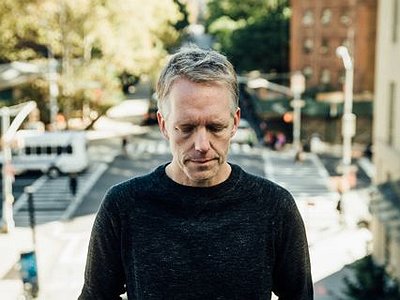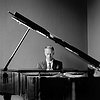Part 1
Name: Chad Lawson
Nationality: American
Occupation: Composer, Pianist
Current Release: Bach Interpreted
Musical Recommendations: Gustavo Santaolalla - if I could be like any composer in the world, it would be Gustavo. Also, Jason Moran (jazz pianist) - If you’re wanting to hear someone with a unique sound who has carved his own path, listen to him.
Website/ Contact: If you enjoyed this interview with Chad Lawson, you can find more information about him on his website.
When did you start composing - and what or who were your early passions and influences?
I was classically trained from the start of my piano lessons and was taught to “play the ink”, or to simply play what was exactly written. It wasn’t until I later became interested in jazz while studying at Berklee College of Music (Boston, MA). At Berklee I learned more about the theory behind “the ink” and how to analyze works, which led to taking certain pieces like a Bach Invention and using that as a template. The process was one of breaking down a piece of music into the chords and the melody the composer wrote with those underlying chords and asking how they connect. Jazz, or perhaps I should say improvised music, is pseudo-‘composition in real time’, if you will. The song begins and the musician creates melodies over the chords/structure of the piece in real time. There’s no eraser, no “what if it went like this?” or even allowance to change the shape of the song by altering the harmonic architecture. I love that element of improvised music. For me, the foundation or core of great improvisation is in creating a strong melody. One obvious great is none other than Chopin. What an incredible lyricist. And if you play or listen through his pieces he takes a simple phrase and embellishes those motifs ever so subtly. It’s stunning (and inspiring) how he would take a few notes for a melody and then when that section is repeated again he adds just enough color each time to keep the listener interested without sounding redundant. Simply beautiful.
For most artists, originality is first preceded by a phase of learning and, often, emulating others. What was this like for you? How would you describe your own development as an artist and the transition towards your own voice?
“Don’t borrow, steal.” was the term I heard in a lot in my later studies. The mindset is to be influenced so greatly by a particular artist that you mirror every aspect of their playing. Whether it’s phrasing, signature patterns or lines they would play or even how they would approach the instrument from a technical standpoint. The purpose was to learn from the masters because more than likely they were ‘stealing’ from the generation before them! For me, there was no pianist other than Oscar Peterson. While Oscar was effortless with his bedazzling speed and ability, it was his touch of the keyboard I was so taken with. It was as if he were tiptoeing across the 88s regardless of tempo. He had a very light touch at the piano and that never really left me. And then you had Keith Jarrett that completed the circle with his strong sense of melody and most importantly his patience. Keith’s playing has been the most influential on my approach to the piano with his willingness to ‘plant a seed, nurture that seed and wait until that seed grows into a tree.’ Whether he is playing solo or with his trio, he is never in a rush to arrive at a particular point.
I learned so much from this that in 2013 I recorded an album The Space Between. It was with this recording that I finally became comfortable in my own skin. After so many years at the piano I actually allowed myself to be me, Chad Lawson, and not someone else. Sometimes as a musician we have this idea that we have to be “entertaining” or impressing the listener. And that can really distort what the artist has at their core not only musically but personally as well. So there were times during this recording that I would stop and ask myself why I was rushing through things. I would then go back and would even take deep breaths between notes or phrases; “just let this grow” I finally said. That was when I finally found my voice, my identity. The opening notes of the album have so much space, are so subtle, everything you shouldn’t begin an album with but I didn’t care. I wanted to be Chad Lawson ever since. It took me long enough to come to this point but I’m grateful I finally did.
What were some of the most important creative challenges when starting out as a composer and how have they changed over time?
I think for a composer it can sometimes be daunting to get the idea started. Once the idea has been born then the process will take over and grow if tended to, but getting the plane off the ground is always the hardest part for some. I think we live in a time of such incredible accessibility that inspiration can be easier to find than 5 or 10 years ago. All one has to do is pull out their smartphone to hear their favorite composer/ artist and be inspired or perhaps their favorite movie that transports them into a different state (the 2001 film, Amélie does that for me every time). One has to be careful though as it’s easy to become over-saturated with the wealth of content so easily within reach.
I believe what has changed for today’s composers is opportunity. Streaming services such as Spotify, Pandora, iTunes and Deezer have completely leveled the playing field. Once upon a time there were these ‘gatekeepers’ called record labels. Decisions were (and continue to be) based on the appeal of current trends and spreadsheets rather than artistic creativity and hearing what is around the corner. With the advent of streaming, creatives are now able to compose, record, and release the material that matters most to them. All the while social media has created an open door atmosphere to most artists who wish to engage with their audiences and vice versa. What other time in history has this been the case? It’s amazing.
Tell us about your studio/work space, please. What were criteria when setting it up and how does this environment influence the creative process? How important, relatively speaking, are factors like mood, ergonomics, haptics and technology for you?
It was only in August 2015 that I got my own private work studio to create. Up to that point it was basically a room in a house shared with my wife and two young children. And while there were challenging moments I think the limitations played to my benefit. It was because there were two young children in the house that I added heavy felt to the piano (allowing me to practice late at night) which created the sound for The Space Between (2013). I was also able to manage my time in a very concentrated effort knowing I only had certain windows of time to work. If I had 2 hours of quiet space while the house was empty, I squeezed everything I could of those 120 minutes! No Facebook, no emails, no distractions; only music.
Now I have that private studio space I’m no longer concerned about how loud the piano is or if the piece that I’m scoring is blaring; in that sense it’s nice. I do find that with more open time I allow more distractions in and it’s something I’m working on. It’s easy to walk in, turn on the computer and respond to a few “important” emails and before I know it I’ve used the 2 hours I generally set aside for morning practice for ancillary things. I generally try to get 3-4 hours a day at the piano and so I break it up throughout the day but if those first 2 hours are blown, it’s really difficult to recover.
I’ve never been one to be ‘mood’ driven by such things as ambience or settings. This is mostly because two are never the same when performing live so I try not to get into the “I must have this” to create mindset. That could turn into a dangerous dependence I imagine.






